Since launching in China in 2016, the social media platform TikTok has emerged as a cultural phenomenon, captivating users globally with its engaging short-form videos. In 2023, the platform boasted 1.5 billion users, and projections anticipate this number to reach 2 billion by the end of 2024.
And, whilst the platform’s popularity continues to skyrocket globally, a new topic of conversation has begun circulating: Can TikTok be viewed beyond its role as a social media platform and considered a search engine in its own right?
While Google maintains its dominance in traditional web searches, TikTok’s increasing search influence, highlighted by the introduction of search ads, has raised questions about its potential to reshape how users seek and discover information.
Despite Google standing firm with a commanding share of the search market in the United States (77.5%) and worldwide (83.5%), Google Senior Vice President Prabhakar Raghavan has publicly recognised TikTok’s search capabilities as an emerging challenge for traditional search engines.
Join us as we delve deeper into this discussion and explore if people really are using TikTok for search, and if so, who are they, and why are they moving away from traditional search engines?
Defining a Search Engine
First things first, what is a search engine? By definition, a search engine is a software application or online service that enables users to search for information on the Internet. It systematically indexes and organises website content, and users can input queries, typically in the form of keywords or phrases, to retrieve relevant results.
The search engine uses algorithms to analyse and rank the indexed content, presenting users with links and brief descriptions on a Search Engine Results Page (SERP). Popular search engines include Google, Bing, and Yahoo and they play a fundamental role in helping users discover and access information across the vast expanse of the internet.
TikTok's Search Functionality
Alike to all social media platforms, TikTok only presents users with search results of content shared directly within the platform rather than from a range of online sources and, therefore, in our opinion, does not meet the definition of a search engine right now.
However, whilst it may not be a conventional search engine, there’s no doubt that people use TikTok to search for content and that it has traditional search engine features. This further emphasises the questions: who is using TikTok in this way, what content are they searching for, and what’s their intent? Let’s dig deeper.
Is TikTok Used for Search?
So, is TikTok actually being used for search? The honest answer? It’s hard to say! Whilst there’s no denying the platform’s popularity, valuable research in the area is limited. Plus, as explored by Sean and Emina in Episode 10 of SEOs Getting Coffee when pondering this much-discussed debate, the difficulty lies within finding accurate and viable data to build an informed judgement at this stage.
Watch Video
SEOs Getting Coffee - Episode #10: Is TikTok a Search Engine? TikTok vs Google
Let’s take a closer look at the information we do have available for now.
User Demographics
From the limited studies carried out so far, the available data presents that somewhat unsurprisingly, those with a growing shift towards TikTok over traditional search engines are younger users.
For example, in a study by Her Campus Media, a company specialising in Gen Z media and college marketing, TikTok emerged as the preferred way to search for over 50% of Generation Z, significantly impacting their buying choices more than any other platform. The online survey, carried out in August 2023 gathered 1,821 responses exclusively from the United States. Notably, 97% of respondents were female, and 71% identified as college students pursuing undergraduate degrees.
It’s important to note that with such a gender bias sample, it’s difficult to apply these findings to Gen Z as a whole or beyond the US.
Another study conducted by Adobe Express, which surveyed 808 US consumers on their TikTok ‘search’ behaviour, found that 41% of respondents considered themselves to have used TikTok as a search engine. And, 1 in 10 Gen Z participants cited that they were more likely to go to TikTok as a search engine than Google.
Here’s a closer look at the generational split of their results:
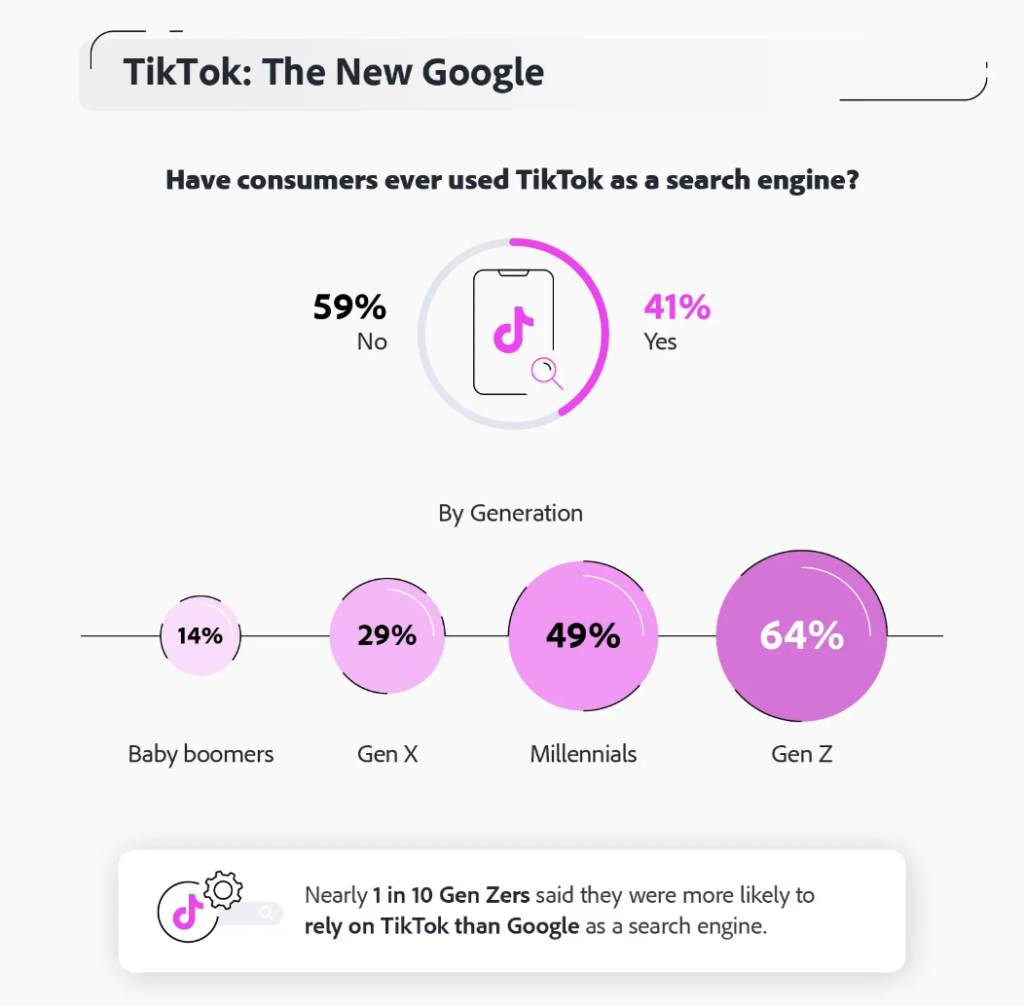
Whilst some questions surround the reliability and validity of research findings at this point, the data suggests that there is undoubtedly a growing shift in consumer search behaviour. This leads us to continue the conversation into what they are searching for and, most importantly, why users are shifting away from conventional search engines…
Exploring TikTok Search Trends: Why Choose TikTok Over Google?
As explored by Sean and Emina – the quality of Google SERP has been a contested issue in recent months. Could this explain why users may or may not be shifting towards TikTok for search?
Are Google Results just pants, so people are leaving?
So, it’s no secret that there’s been a growing sentiment that Google’s search results have seen a decline in quality. This perspective is substantiated by research conducted by experts like Lily Ray, whose findings underscore the challenges users encounter in accessing relevant and trustworthy information. Lily Ray’s analysis often shared via posts in LinkedIn and her X account, sheds light on various factors contributing to this perceived decline, including algorithmic changes, content proliferation, and the rise of misinformation.
As users increasingly rely on search engines for information, ensuring the integrity and relevance of search results becomes paramount. Lily Ray’s research serves as a critical voice in advocating for transparency and accountability within the search ecosystem.
And Lily is not alone in her findings! As reported by Gizmodo in January 2024, further research carried out by a team of researchers from Leipzig University, Bauhaus-University Weimar, and the Center for Scalable Data Analytics and Artificial Intelligence has also found evidence to support the decline in the quality of Google search results, with Google losing the battle against spam sites creeping their way up the SERP. Such findings suggest that the quality of the SERP could be playing a role in people moving away from Google search as we know it.
Changing Consumer Search Behaviour
As we know, Adobe Express aimed to shed light on this question, finding that TikTok has become the go-to “search engine” for over half of Generation Z, with 74% of them utilising TikTok’s search functionality.
Key factors driving this shift for the sample group included the unique video format of search results (cited by 69% of respondents), the relatability of answers (65%), and the personalised nature of responses (47%).
According to the survey, 2 in 5 Gen Zers were drawn to TikTok due to content better tailored to their tastes, while over 1 in 4 baby boomers appreciated the platform’s narrative-driven videos. Video tutorials ranked as the preferred content for 62% of respondents, followed by product or service reviews (39%) and personal stories (38%).
It’s also been suggested that TikTok is emerging as a significant news source. Findings from the Reuters Institute Digital News Report 2023 demonstrate that whilst news consumption on the platform remains fairly low vs other platforms, it has shown a consistent upward trend in recent years.
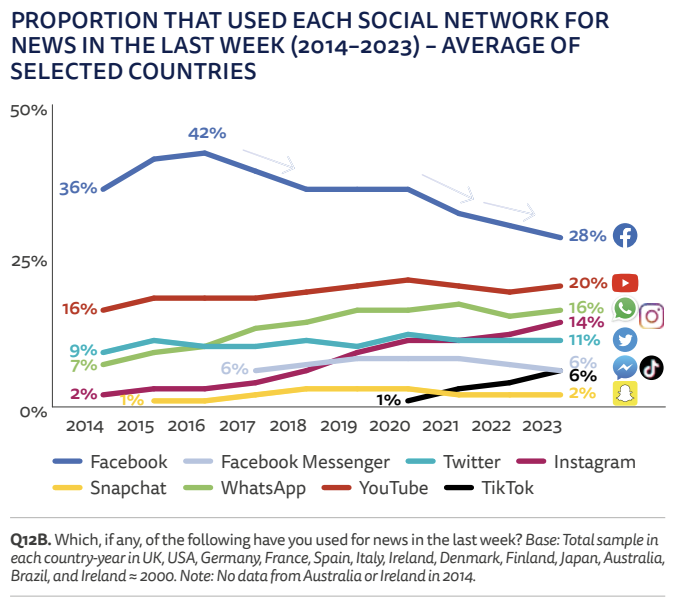
Nevertheless, it’s worth noting that individuals who turn to social media for news often diversify their sources. On TikTok, the quest for ‘news’ predominantly gravitates towards influencer accounts rather than traditional mainstream news outlets.
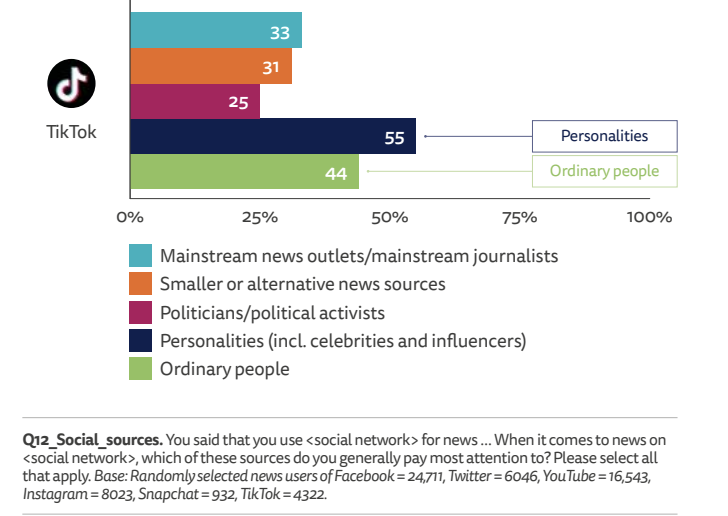
Source: Reuters Institute Digital News Report 2023. Proportion that pay attention to each source for news (by social network) – All Markets. See full graph, including all social networks, on page 13 of report.
The Reuters Institute Digital News Report echos the findings that TikTok use is most prevalent among younger people. They also found that:
Although the averages for TikTok are relatively low, usage is much higher with younger groups and in some Asia-Pacific, Latin American, and African countries. It has played a role in spreading both information and misinformation in recent elections in Kenya5 and Brazil6 and has grown strongly in parts of Eastern Europe, where the Ukrainian conflict increased its profile.
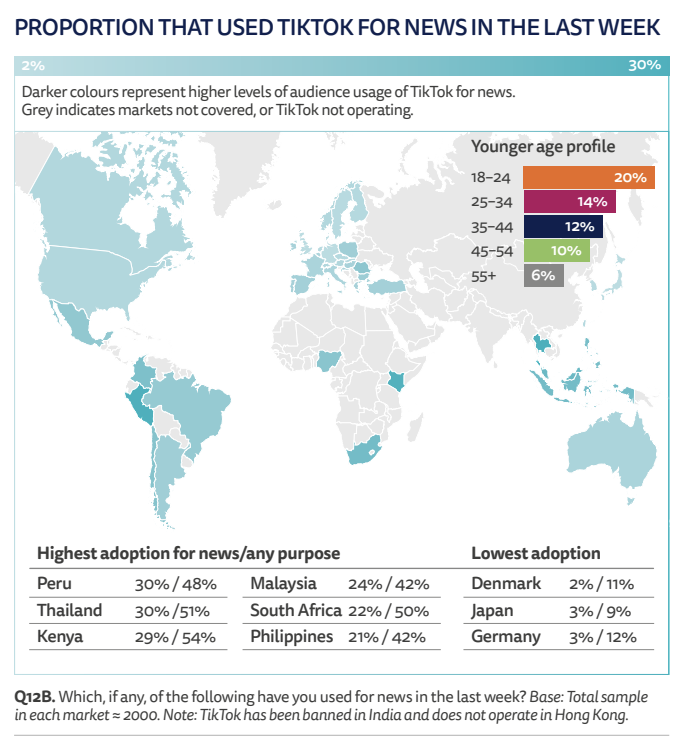
These findings demonstrate that in the UK, TikTok’s news adoption rate remains low in comparison to other areas of the globe and that the challenge of consistently providing valuable and trustworthy search results isn’t exclusive to Google. Despite its popularity, TikTok isn’t immune to limitations and obstacles in delivering credible search results to users.
User Intent on TikTok
As reported by Campaign Asia, agency Rise at Seven’s research delved further into user intent on TikTok by analysing thousands of keywords across various industries. They concluded that the platform is winning search volume over Google, particularly in “how to” queries. Analysing thousands of keywords, the agency found that 73% of TikTok searches were informational, while 21% were commercially motivated, surpassing Google’s search volumes by tenfold in this category.
As raised by Emina in the recent episode of SEOs Getting Coffee, the question here lies around the reliability of the keyword volumes since many studies and platforms in this area are currently forced to ‘estimate’ these volumes due to the lack of data available.
However, in some cases, TikTok’s impact on consumer behaviour is undeniable, with the hashtag #TikTokMadeMeBuyIt having gained traction globally. The Her Camus Survey found that 72% of Gen Zers reported purchasing a product after seeing it on TikTok, solidifying the platform’s role in influencing buying decisions.
The study also found that TikTok influences purchase decisions for 62% of Gen Z, more than any other platform, further demonstrating the platform’s impact on the age group. This is an increase of 15% compared to Her Campus Media’s 2022 version of this survey.
Furthermore, they concluded that product discovery on TikTok is driven by trust, as 62% of respondents trust influencers and brands more than their own family or friends for recommendations.
What Does TikTok Search Mean for SEO?
Whilst the picture is undoubtedly changing, we believe it’s probably a little early to draw conclusions on exactly what TikTok search will mean for SEO in the long term. However, if the research findings available do accurately represent consumer behaviour and search intent, it’s safe to say that things in SEO will be changing and that TikTok SEO will no doubt become a component of our overall SEO strategies.
Right now, for those using TikTok as part of their digital marketing strategy, it’s important to respond to these trends and ensure that you are already optimising your video content for TikTok search.
Carry out some keyword research by making the most of TikTok’s keyword research tool to try and build a picture of what your audience are searching for. Another great way to learn more about popular search terms is simply by typing terms into the TikTok search bar and exploring the related search suggestions.
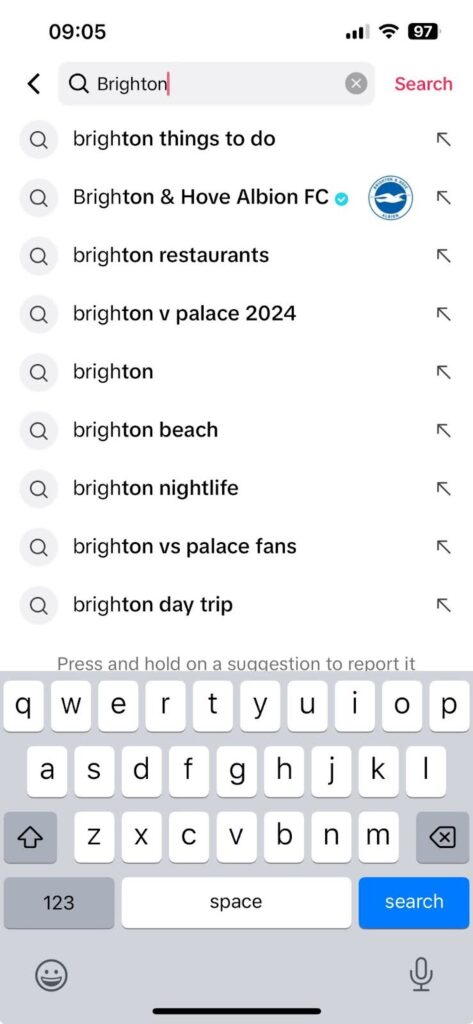
You should then incorporate these keywords and phrases into your videos and captions alongside trending hashtags.
If TikTok isn’t yet part of your strategy, it could be time to explore whether your audience is using the platform and whether it makes sense to allocate some of your efforts there moving forward.
Closing Thoughts
In summary of our exploration of the recent hot topic ‘Is TikTok a search engine?’, whilst it’s clear that the platform exhibits search-like features and has gathered attention for its influence on user behaviour, in our opinion, it still doesn’t quite fit the traditional definition of a search engine.
Plus, although there’s data indicating TikTok is used being for search, the reliability and validity of current research are questionable due to sample limitations and issues with accurately analysing search volume. So, we don’t think we can draw any concrete conclusions here just yet.
However, despite not being a search engine in the traditional sense, the platform is undeniably reshaping how users seek and consume information. The seeming impact on consumer behaviour, particularly among the younger demographic, is noteworthy. From influencing buying decisions to becoming a news source, TikTok’s role extends beyond mere entertainment. It presents an exciting prospect of how we may be required to respond and alter our SEO strategies in the future.
While the impact on SEO may not be totally clear yet, adapting strategies to incorporate TikTok’s unique features and understanding user intent on the platform will no doubt become more important.
In essence, the overall conversation and TikTok’s ascent indicate a shift in habits related to obtaining and consuming information, and we’re looking forward to seeing where this one goes.
For more insights and in-depth conversations on the latest in SEO and digital marketing strategies, stay stuned for upcoming episodes of “SEOs Getting Coffee.” Subscribe to our channel for regular updates and expert opinions.











